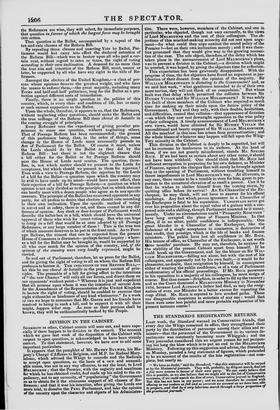DIVISION IN THE CABINET.
SOMEHOW or other, Cabinet secrets will ooze out, and more espe- cially if there happen to be division in the council. The account which we gave last week of the disposition of the Cabinet with respect to open questions, is acknowledged to have been strictly correct. To that statement, however, we have now to add some important particulars.
It appears that the pamphlet of Mr. HENRY BULWER, his Ma- jesty's Chargé d'Affaires in Belgium, and M.P. for Radical Mary- lebone, which advised the Whigs to concede and the Radicals to accept open questions, as the basis of a new and unassail- able union, was not in any way offensive, to say the least, to Lord MELBOURNE; that the Premier, with the sagacity and manliness for which he has obtained credit, had made up his mind to the ex- pediency, not to say necessity, of " popularizing" the Government so as to obtain for it the strenuous support of all classes of Re- formers; and that it was his intention, after giving the Lords one more trial, to dissolve the PEEL Parliament, and take the opinion d the country upon the character and objects of his Administra-
tion. There were, however, members of the Cabinet, and one in particular, who objected, though not very earnestly, to the views of Lord MELBOURNE and the rest of their colleagues. The ob- jections of this mischief-making minority did not rest upon argu- ment—for what could they urge aeainst the sound policy of the Premier ?—but on their own inclination merely ; and it was there- fore presumed that they would give way to the growing necessi- ties of the case. The sole object, therefore, of the delay which has taken place in the announcement of Lord MELBOURNE'S plans, was to prevent a division in the Cabinet,—a division which might be averted, it was hoped, by giving the objectors time for reflection.
This expectation has been grievously disappointed. With the progress of time, the few objectors have found an argument in jus- tification of their dissent from the opinion of the majority. Sir WILLIAM MOLESWORTH is dictating to the Government! and, as we said last week, " what gentlemen intended to do of their own mere motion, they will not think of on compulsion." But whose fault was that delay which permitted the collision between Sir HUSSEY VIVIAN and Sir WILLIAM MOLESWORTH ? It was solely the fault of those members of the Cabinet who required so much time for making up their minds upon the future policy of the Government. They and they only, with their doubts, hesitations, and difficulties, caused that collision—that appearance of dictation —on which they now rest downright opposition to the wise policy of their colleagues. A timely announcement of Lord MELBOURNE'S own views, would have obtained for Sir HUSSEY VIVIAN the unconditional and hearty support of Sir WILLIAM MOLESWORTH. All the mischief in this case has arisen from procrastination ; and the whole blame of whatever may happen will fall upon the Whig- Tory minority in the Cabinet.
This division in the Cabinet is deeply to be regretted, but will not be overcome by tenderness to its authors. At the head of them, if we are not greatly misinformed, stands Mr. SPRING Rica. If we had been as certain about any other name, it should not have been withheld. One should think that Mr. RICE had sufficient occupation in preparing for his own defence, as Minister of Finance, against the charges that will surely be brought against him at the opening of Parliament, without troubling himself to throw impediments in Lord MELBOURNE'S way. At all events, in any case, there seems to be a tumble in store for him, great in pro- portion to the unnatural elevation of so small a person. Can it be that he wishes to shelter himself from the coming storm, by quitting office before its arrival ? An Ex-Chancellor of the Ex- chequer, he may think, will not have to answer for his official miscloings. Any fact which proves ignorance in a Chancellor of the Exchequer is fatal to his reputation. VANSITTART never got over his proposition about the equal value of a guinea with a one- pound note and a shilling, though Parliament assented to it unani- mously. Under no circumstances could "Prosperity ROBINSON" have long occupied the place of Finance Minister. In that office, if in no other, public confidence is indispensable. One great blunder in a Chancellor of the Exchequer, like the dishonour of a single acceptance in commerce, is destructive of that credit, that prestige, which is the life of banks and finance ministers. The public have lost all confidence in Mr. RICE. His tenure of office, as Chancellor of the Exchequer, is not worth three months' purchase. He may not, therefore, be anxious for the stability of the present Cabinet apart from himself. If he could break up the Government, and lay the blame on Sir WIL- LIAM MoLaswoiern,—falling not alone, but with the rest of his colleagues, and apparently not by his own fault,—it would be far pleasanter, no doubt, than resignation by himself, in consequence either of wanting the public confidence, or of a vote of Parliament condemnatory of his official proceedings. If Mr. RICE persevere in his opposition to a majority of his colleagues, he must resign of course. But then comes—Brighton, in order to fill up the vacancy; and as the Court dismissed a MELBOURNE Ministry in November 1834, because Lord ALTHORP'S father had died, so may the resig- nation of even one Minister be a better excuse for repeating the coup d'etat. Mr. RICE is reputed to love crooked paths. These are disagreeable suspicions to entertain of any one : would that there were some less painful and more probable explanation of his present tortuous course !


























 Previous page
Previous page